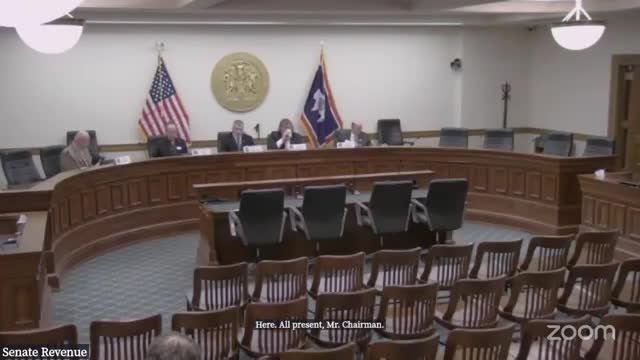Revenue Committee advances changes to tangible personal property rules, carves out mobile homes and state-assessed accounts
Get AI-powered insights, summaries, and transcripts
Subscribe
Summary
The Senate Revenue Committee advanced Senate File 49 after adopting amendments that exclude mobile homes and state-assessed property from a 20% depreciation-floor provision, lower the depreciation floor to 0% and replace ‘‘acquisition value’’ language with ‘‘purchase value.’’ The bill passed the committee 3–2.
The Revenue Committee on Oct. 12 advanced Senate File 49, a bill that changes how tangible personal property is depreciated for property-tax purposes, adopting several amendments that carve out state-assessed accounts and titled mobile homes and reduce the depreciation floor to zero.
The bill, presented by Ken Gill, administrator of the Property Tax Division at the Wyoming Department of Revenue, would prevent county assessors from continuing to ‘‘trend’’ depreciated personal property values upward once they have reached a statutory floor. Gill said the bill as drafted would freeze an asset’s value once it reaches the floor rather than continuing to inflate that historic cost to today’s dollars.
Committee members and county assessors said the indexing that has been applied after depreciation has produced values that exceed what assessors and taxpayers expect, and they urged caution while the Department of Revenue upgrades its CAMHIS system to handle the new rule. Dixie Huxtable, Congress County assessor and a representative of the Wyoming County Assessors Association, told the committee many filers already provide a reported installed cost and recommended changing the draft bill’s phrase ‘‘acquisition value’’ to ‘‘reported installed cost’’ and setting an effective date of Jan. 1, 2026, to allow software updates.
Gill said the department lacks a statewide index for centrally assessed property and that state-assessed accounts — such as railroads, utilities and telecommunications companies — are appraised at the company level and often lack a discrete acquisition figure tied to Wyoming. An amendment adopted by the committee removes state-assessed property and titled mobile homes from the bill’s floor-and-trend language.
Members also debated whether the valuation base should include freight and installation. Gill and assessors said ‘‘installed cost’’ is the customary starting point for personal property renditions; some senators argued for ‘‘purchase value’’ to limit the base to catalog or invoice prices and to avoid adding installation and freight into a continuing tax basis.
The committee adopted three key amendments during deliberations: (1) an amendment carving out state-assessed property and titled mobile homes from the bill’s floor/trend provision (passed 3–2 by voice vote), (2) an amendment lowering the depreciation floor to 0% (passed by voice vote) and (3) replacement of the phrase ‘‘acquisition value’’ with ‘‘purchase value’’ (passed by voice vote after earlier language to insert ‘‘reported installed cost’’ failed). After debate and amendment, the committee approved the bill on a roll call, 3–2 (Senator French, Senator Eyed and Chairman McEwen voted aye; Senator Case and Senator Pappas voted no).
Public witnesses from agriculture and energy organizations told the committee they generally support the bill. Ryan McConaughey of the Petroleum Association of Wyoming and Travis Ditai of the Wyoming Mining Association both said their organizations support the measure, and Brett Moline of the Wyoming Farm Bureau Federation described the bill’s current drafting as appearing to grant the $50,000 exemption per county report (discussion later in the meeting clarified a different bill). Several industry speakers were available to answer technical questions.
Assessors flagged two implementation issues the committee noted: the department’s CAMHIS/CAMA system must be updated to automate any new floor or freeze provision, and many taxpayers do not submit complete installed-cost renditions (assessors reported that in some sectors such as oil and gas a substantial share do, while in business personal property reporting rates are lower). Dixie Huxtable asked that any effective date allow counties time to convert to the new system and train staff.
Committee discussion also clarified how mobile homes are currently valued: assessors typically start from published cost tables (Marshall & Swift) and apply depreciation; mobile-home sales are not consistently recorded in public deeds the way real-property sales are, so assessors rely on cost tables and local knowledge. Huxtable and Gill explained that mobile homes are titled personal property in Wyoming and that title changes are the only routine record of a sale; sales prices are not automatically forwarded to assessors.
The committee directed no further formal study at the hearing. The bill, as amended, will proceed to the next floor step with the committee’s recommendation.
Ending note: The committee’s final vote on the amended bill was 3–2, sending the measure forward with carve-outs for state-assessed property and titled mobile homes, elimination of the 20% floor (replaced by a 0% floor), and ‘‘purchase value’’ replacing the term ‘‘acquisition value."
